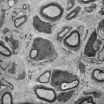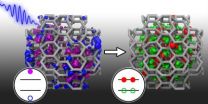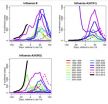(Press-News.org) DURHAM, NC -- Duke University biomedical engineers have developed a new delivery system that overcomes the shortcomings of a promising class of peptide drugs – very small proteins – for treating diseases such as diabetes and cancer.
There are more than 40 peptide drugs approved for use in humans and more than 650 are being tested in clinical studies. One example is the hormone insulin, a peptide that regulates the metabolism of carbohydrates in the body and is used as a drug to treat diabetes.
Despite their effectiveness, peptide drugs cannot achieve their full potential for a number of reasons. They are rapidly degraded in the blood stream and they are cleared rapidly from the body, which requires multiple, frequent injections. Because of this, peptide concentrations in the blood can rise precipitously just after injection and fall dramatically soon thereafter, causing unwanted side effects for patients.
One popular method to solve this problem involves loading peptide drugs into polymer microspheres that are injected under the skin and slowly degrade to release the peptide drug. Microsphere-release technology has proven useful, but has many issues related to its manufacture and ease of patient use, the researchers said.
"We wanted to know if we could create a system that does what the polymer microspheres do, but gets rid of the microspheres and is more patient-friendly," said Ashutosh Chilkoti, Theo Pilkington professor of biomedical engineering in Duke's Pratt School of Engineering.
The new approach involves making a "fusion protein" that consists of multiple copies of a peptide drug fused to a polymer which is sensitive to body heat. The fusion molecule is a liquid in a syringe but transforms into a "jelly" when injected under the skin. Enzymes in the skin then attack the injected drug depot and liberate copies of the peptide, providing a constant and controllable release of the drug over time.
Miriam Amiram, former Chilkoti graduate student and first author on the paper, dubbed the new delivery system POD, for protease-operated depot.
In the latest experiments, published on-line in the journal Proceedings of the National Academy of Sciences, the researchers fused glucagon-like peptide-1 (GLP-1), a hormone that regulates the release of insulin, with a genetically engineered heat-sensitive polymer to create the POD.
"Remarkably, a single injection of the GLP-1 POD was able to reduce blood glucose levels in mice for up to five days, which is 120 times longer than an injection of the peptide alone," Chilkoti said. "For a patient with type 2 diabetes, it would be much more desirable to inject such a drug once a week or once a month rather than once or twice a day.
"Additionally, this approach avoids the peaks and valleys of drug concentrations that these patients often experience," Chilkoti said.
Unlike peptide-loaded microspheres, PODs are also easy to manufacture, because the peptide drug and the heat-sensitive polymer are all made of amino acids. They can be built as one long stretch of amino acids by engineered bacteria.
"This new delivery system provides the first entirely genetically encoded alternative to peptide drug encapsulation for sustained delivery of peptide drugs," Chilkoti said.
###
The other Duke members of the team were Kelli Luginbuhl, Xinghai Li and Mark Feinglos. The research was supported by the National Institute of Diabetes and Digestive and Kidney Diseases. END
Slow-release 'jelly' delivers drugs better
2013-01-29
ELSE PRESS RELEASES FROM THIS DATE:
Public report national audit of percutaneous coronary interventional procedures 2011
2013-01-29
The 2011 annual report of the National Audit of Percutaneous Coronary Intervention (PCI) highlights the significant progress within hospitals to expand PCI services to treat more patients with acute coronary syndromes.
PCI mechanically improves blood flow to the heart and can be used to relieve the symptoms of angina, prevent and treat heart attacks. When used to treat heart attack patients, the procedure is called primary PCI. Commissioned and funded by the Healthcare Quality Improvement Partnership, the National Audit of PCI is clinically led by the British Cardiovascular ...
Cardiac disease linked to higher risk of mental impairment, Mayo Clinic finds
2013-01-29
ROCHESTER, Minn. -- Cardiac disease is associated with increased risk of mild cognitive impairment such as problems with language, thinking and judgment -- particularly among women with heart disease, a Mayo Clinic study shows. Known as nonamnestic because it doesn't include memory loss, this type of mild cognitive impairment may be a precursor to vascular and other non-Alzheimer's dementias, according to the findings published online Monday in JAMA Neurology.
Mild cognitive impairment is an important stage for early detection and intervention in dementia, says lead author, ...
New research will help shed light on role of Amazon forests in global carbon cycle
2013-01-29
The Earth's forests perform a well-known service to the planet, absorbing a great deal of the carbon dioxide pollution emitted into the atmosphere from human activities. But when trees are killed by natural disturbances, such as fire, drought or wind, their decay also releases carbon back into the atmosphere, making it critical to quantify tree mortality in order to understand the role of forests in the global climate system. Tropical old-growth forests may play a large role in this absorption service, yet tree mortality patterns for these forests are not well understood. ...
The tales teeth tell
2013-01-29
For more than two decades, scientists have relied on studies that linked juvenile primate tooth development with their weaning as a rough proxy for understanding similar developmental landmarks in the evolution of early humans. New research from Harvard, however, is challenging those conclusions by showing that tooth development and weaning aren't as closely related as previously thought.
Using a first-of-its-kind method, a team of researchers led by professors Tanya Smith and Richard Wrangham and Postdoctoral Fellow Zarin Machanda of Harvard's Department of Human Evolutionary ...
Glial cells assist in the repair of injured nerves
2013-01-29
This press release is available in German.
Unlike the brain and spinal cord, the peripheral nervous system has an astonishing capacity for regeneration following injury. Researchers at the Max Planck Institute of Experimental Medicine in Göttingen have discovered that, following nerve damage, peripheral glial cells produce the growth factor neuregulin1, which makes an important contribution to the regeneration of damaged nerves.
From their cell bodies to their terminals in muscle or skin, neuronal extensions or axons in the peripheral nervous system are surrounded ...
EARTH: Drinking toilet water
2013-01-29
Alexandria, VA – Would you drink water from a toilet? What if that water, once treated, was cleaner than what comes out of the faucet? Although the imagery isn't appealing, as climate change and population growth strain freshwater resources, such strategies are becoming more common around the world — and in the United States.
Over the last several decades, local and regional water shortages have become increasingly common. These shortages have led to increased friction over water resources. Technologies are currently being developed to help make wastewater recycling ...
1 in, 2 out: Simulating more efficient solar cells
2013-01-29
Using an exotic form of silicon could substantially improve the efficiency of solar cells, according to computer simulations by researchers at the University of California, Davis, and in Hungary. The work was published Jan. 25 in the journal Physical Review Letters.
Solar cells are based on the photoelectric effect: a photon, or particle of light, hits a silicon crystal and generates a negatively charged electron and a positively charged hole. Collecting those electron-hole pairs generates electric current.
Conventional solar cells generate one electron-hole pair ...
Study finds eating deep-fried food is associated with an increased risk of prostate cancer
2013-01-29
SEATTLE – Regular consumption of deep-fried foods such as French fries, fried chicken and doughnuts is associated with an increased risk of prostate cancer, and the effect appears to be slightly stronger with regard to more aggressive forms of the disease, according to a study by investigators at Fred Hutchinson Cancer Research Center.
Corresponding author Janet L. Stanford, Ph.D., and colleagues Marni Stott-Miller, Ph.D., a postdoctoral research fellow and Marian Neuhouser, Ph.D., all of the Hutchinson Center's Public Health Sciences Division, have published their findings ...
Study shows climate change could affect onset and severity of flu seasons
2013-01-29
The American public can expect to add earlier and more severe flu seasons to the fallout from climate change, according to a research study published online Jan. 28 in PLOS Currents: Influenza.
A team of scientists led by Sherry Towers, research professor in the Mathematical, Computational and Modeling Sciences Center at Arizona State University, studied waves of influenza and climate patterns in the U.S. from the 1997-1998 season to the present.
The team's analysis, which used Centers for Disease Control data, indicates a pattern for both A and B strains: warm winters ...
Research: Military women may have higher risk for STIs
2013-01-29
As the number of women in the military increases, so does the need for improved gynecologic care. Military women may be more likely to engage in high-risk sexual practices, be less likely to consistently use barrier contraception, and, therefore, more likely to contract sexually transmitted infections (STIs), according to research recently released by a physician at Women & Infants Hospital of Rhode Island.
Vinita Goyal, MD, MPH, followed up earlier research into the rates of contraception use and unintended pregnancy by today's military women and veterans with her latest ...




